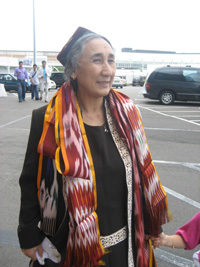|
Washington:
The translators kept bursting into tears.
That was a problem for Rebiya Kadeer, the tiny and fiery matriarch
of the Uighur diaspora, who lives in Fairfax county and who was
leading a protest march on the Chinese embassy in Washington on
Tuesday.
She was speaking Uighur, the Turkic language of her people. Unlike
her younger translators who spelled one another at the bullhorn,
Kadeer, 63, scarcely betrayed weakness in the fierce planes and
furrows of her face.
Although the Chinese embassy said she “instigated” the bloody
rioting in her homeland in far western China, she looked almost
serene.
Her problem: How do you get the message to the wider world, via the
assembled television cameras, if the message comes out soused and
doused in sobs and wailing? Or maybe that is the message.
The violence this week leaves many Uighurs in a state of pure,
helpless emotion. Some say loved ones have been killed. Others can’t
reach friends and fear the worst.
The riots and the crackdown in Urumqi, the capital of the Xinjiang
region, are proving to be a perverse opportunity. For much of their
history, the Uighurs have been a relatively obscure, Muslim ethnic
minority. This week they have been elevated closer to the Tibetans
in terms of publicity for civil rights struggles in China.
This is the Uighurs’ moment. And Kadeer, they say, is their
“mother”. “Every day Uighurs are dying!” Kadeer said through a
now-composed translator. “I consider myself the voice of millions of
Uighur people. I consider myself as their tears.”
Chinese officials say Kadeer’s role in the recent bloodshed is more
than symbolic. The Associated Press cites officials saying they have
a recording of Kadeer speaking by phone to a relative in Urumqi,
discussing in advance demonstrations that occurred last weekend.
Kadeer rejects the charge. She says she indeed called her brother to
alert him to announcements being circulated by others on the
Internet. “I urged my brother to stay at home that day, and to ask
my other family members to stay at home as well, fearing that they
may be subject to violence at the hands of the authorities if they
ventured outside,” she said. “In no way did I call on anyone, at any
time, to demonstrate.”
Kadeer said she condemned any violence committed by Uighurs, but
blamed the authorities: “The Chinese police provoked the violence.”
The metaphorical mother of millions has 11 children of her own.
Two of her sons are in prison in China. A former laundress, she
built a successful business empire in trade, retail and restaurants
and was hailed by the government as proof that opportunity exists in
China. She joined the national government consultative body.
But she used her prominence to support Uighur causes and spoke
against what she considered assaults on Uighur rights and culture.
She was jailed in 1999 for allegedly “passing intelligence” — in the
form of publicly available news articles — to foreigners. Freed in
2005, she was exiled to the US.
|





 I
I